Islamic State: Where key countries stand
- Published
The BBC's Jonathan Marcus examines the increasingly risky air war over Syria
The lightning rise of Islamic State (IS), the jihadist militant group that has seized large parts of Syria and Iraq since 2014, has sent shockwaves through the Middle East and beyond.
A US-led coalition of of Western and Middle Eastern countries began air strikes against the group in Iraq in August 2014 and in Syria a month later.
The UK began striking IS targets in Iraq in September 2014 and extended its involvement to Syria in December 2015.
Russia began carrying out its own air strikes in Syria in September 2015 after a request from Syrian President Bashar al-Assad, who has clung on to power despite more than four years of civil war.
Here we look at where the key countries involved in the conflict stand.
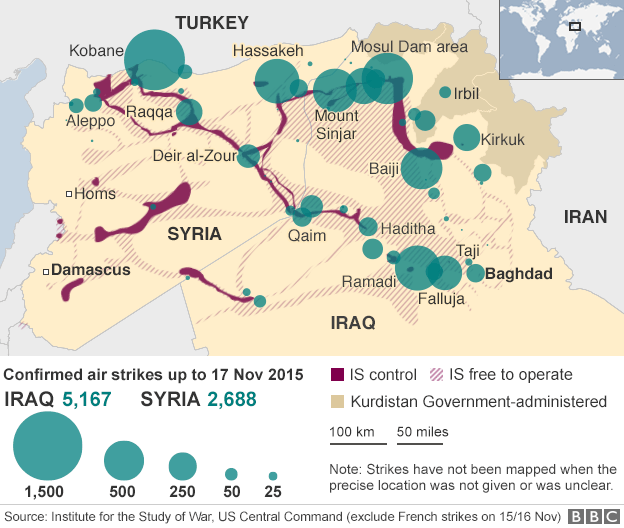
United States
The US air force has carried out the majority of air strikes against IS targets since forming a coalition of Western and regional powers in August 2014.
President Barack Obama is extremely reluctant to send ground troops to fight IS after protracted and unpopular wars in Iraq and Afghanistan, but the US does have about 3,500 troops in Iraq to train the country's armed forces.
The US has also provided weapons and training to "moderate" Syrian rebel groups, and unconfirmed reports suggest US special forces have been fighting alongside anti-IS forces in both Iraq and Syria.
In October US Defence Secretary Ashton Carter signalled a possible shift in the US campaign against IS, telling reporters that US forces were prepared to engage in "direct action on the ground".
Mr Carter did not go into detail about the circumstances under which the US might carry out ground operations against IS, but said: "Once we locate them, no target is beyond our reach."

Saudi Arabia
Regional Sunni power Saudi Arabia is part of US-led military action against IS targets in Syria.
Riyadh also agreed to a US request to provide a base to train moderate Syrian rebel forces.
The kingdom has been a key supporter of the rebels, including hardline Islamist groups, but it has rejected an Iranian accusation that it has directly supported IS.
However, wealthy Saudis have sent donations to the group and some 2,500 Saudi men have travelled to Syria to fight.
The Saudi authorities are concerned that IS will inspire Saudi jihadists to challenge the monarchy's legitimacy and seek to overthrow it.
In July 2014, Riyadh deployed 30,000 troops to beef up security along its border with Iraq, and the following month hosted Iran's deputy foreign minister as the two regional rivals agreed to co-operate.

Jordan
Jordan, a staunch US ally, said it had joined the US and several Gulf Arab states in carrying out air strikes on IS militants in Syria in September 2014 to "ensure the stability and security" of its borders.
A government spokesman said it took action in order to "pre-empt danger before it arrived in our country", and that he believed the Jordanian public would understand the need to forestall the jihadist group before it became active in Jordan.
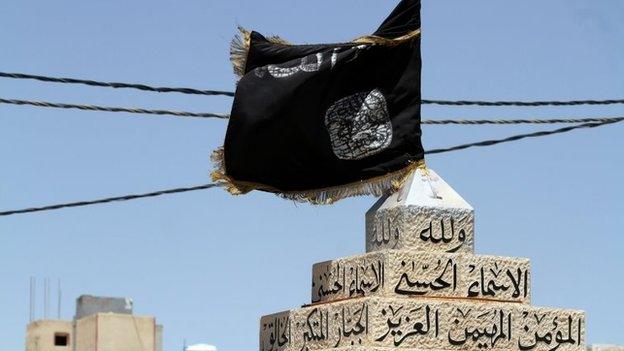
The black flag used by Islamic State was flown in the main square in the Jordanian town of Maan in July 2014
IS has threatened to "break down" Jordan's borders and the group enjoys the support of a growing number of people in the kingdom, some of whom staged demonstrations in the southern town of Maan in June 2014. More than 2,000 Jordanian citizens are believed to have travelled to Syria to fight in the past three years.
Before launching the air strikes on IS, the Jordanian military had doubled its military presence along the border with Iraq.
The killing of Jordanian pilot Moaz al-Kasasbeh, captured by IS in December 2014, appears to have strengthened the government's resolve to take on the militants, with King Abdullah II saying his death would not be in vain and promising a "severe response".

Iran
Regional Shia power Iran has seen IS - which regards Shia Muslims as heretics who should be killed - advance to within 25 miles (40km) of its border.
Although Iran stands on the opposite side of much of the international community over Syria, it has called for co-operation against IS. It has reached out to its rival Saudi Arabia - the leading Sunni power - and turned a blind eye to US actions in Iraq, which it has historically opposed.
Officially Iran denies it has deployed any combat troops in Syria, but in June 2015, the official Irna news agency said at least 400 Iranian and Iran-based Afghan "volunteers" had been killed in the past four years.
In Iraq, the Iranians have played a key role in countering IS. Revolutionary Guards have advised Iraqi security forces, Iranian pilots have carried out air strikes, and Iranian-backed Shia militia have been mobilised.

Iraq
The former Shia-dominated government of Nouri Maliki marginalised Iraq's Sunni community, creating conditions which helped the extremist Sunni IS come to prominence.
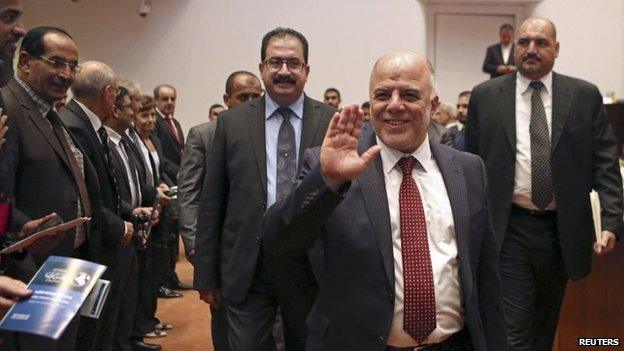
The US hopes Prime Minister Haider al-Abadi's administration can win the support of Iraq's Sunnis
When IS overran the northern city of Mosul in June 2014 before moving southwards, Mr Maliki requested US air strikes. However, US President Barack Obama said further military assistance was dependent on an inclusive government being formed.
He nevertheless launched air strikes in August 2014 when thousands of members of the Yazidi religious minority became trapped on Mount Sinjar.
In September 2014, Mr Maliki stepped aside and a new Iraqi government was named. The next phase of US assistance will reportedly involve an intensified effort to train, advise and equip the Iraqi military, Kurdish Peshmerga fighters and Sunni tribesmen willing to turn against IS.
It is not clear how new Prime Minister Haider al-Abadi will deal with the Shia militiamen who have stopped IS reaching Baghdad. Some have been accused of operating outside of the state's control and carrying out reprisal attacks against Sunnis.

Syria
Since the start of the uprising against his rule in March 2011, President Bashar al-Assad has repeatedly warned of the threat of Islamist extremists to Syria and the wider region.
Western powers initially dismissed Mr Assad's portrayal of his opponents as "terrorists", but became increasingly concerned by the rise of IS and al-Qaeda's affiliate, al-Nusra Front.
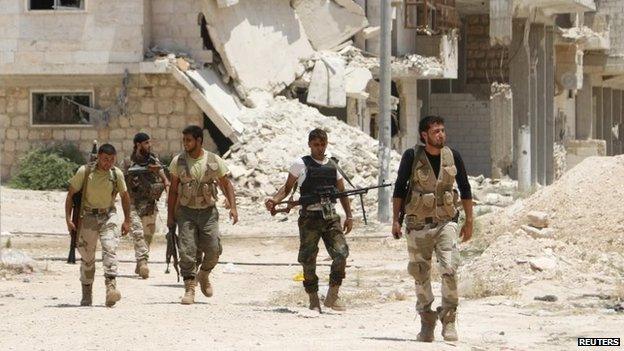
The US is relying on "moderate" Syrian rebels to take the fight to IS
Although they now acknowledge that IS cannot be beaten without attacking its strongholds in Syria, Western powers still want Mr Assad out of power and are reluctant to co-operate with him.
The Syrian foreign ministry said it was given advance warning of the US-led air strikes on IS targets on its territory in September 2014, stating it supported international efforts at "combating terrorism".

Russia
What hardware does Russia have?
Russia is not part of the US-led coalition but started carrying out air strikes in Syria in September 2015. It has also launched missiles from warships in the Caspian Sea.
President Vladimir Putin says his country is targeting IS strongholds and other militant fighters. However, the US fears Russia is actually targeting opponents of Syrian President Bashar al-Assad, who is a Russian ally.
Russia now believes that a bomb brought down the Russian airliner over Egypt last month, killing more than 200 people, mostly Russian holidaymakers. Sinai Province, an IS-linked Egyptian group, said it had downed the jet.

United Arab Emirates
The UAE was reported to have offered its air force to attack IS positions in Iraq before it participated in the military action in Syria in September 2014.
It is vehemently opposed to Islamist groups in the region and is believed to have launched air strikes on Islamist-allied militia in Libya from bases in Egypt in August 2014.
However, US officials have told the BBC that the UAE suspended its involvement in the strikes after the Jordanian pilot was captured.

Qatar
Qatar was another Gulf state to participate in or support the US-led military action against IS in Syria. The emirate is the location of Al Udeid Air Base, a highly-classified US facility from which all attack and surveillance missions in the region are co-ordinated by US Central Command (CentCom).
The Qatari government has been forced to repeatedly deny accusations from Iraq's Shia leaders that it provided financial support to IS. However, wealthy individuals in the emirate are believed to have made donations and the government has given money and weapons to hardline Islamist groups in Syria.
Doha is also believed to have links to the al-Nusra Front, an al-Qaeda affiliate.

Bahrain
Bahrain has also participated in or supported the US-led military action against IS in Syria.
The kingdom hosts the headquarters of the US Navy's Fifth Fleet, which is responsible for naval forces in the Gulf, Red Sea, Arabian Sea and parts of the Indian Ocean.

Turkey
The significance of the Incirlik air base in southern Turkey
Turkey is eager to defeat IS, which has advanced into territory along its borders with Syria and Iraq.
Turkey believes that the deadly bombings in the border town of Suruc, in July 2015, which killed 32 youth activists, and in the capital Ankara in October, which killed nearly 100, were carried out by IS.
Turkish jets have carried out attacks on IS positions in Syria, and the Nato member is allowing US jets to use its southern Incirlik air base.

Lebanon
Lebanon has become deeply divided by the conflict in Syria, and has had to deal with an overspill of violence and a huge influx of refugees.
In August 2014, Syria-based IS fighters raided the border town of Arsal, killing and kidnapping dozens of Lebanese security personnel.
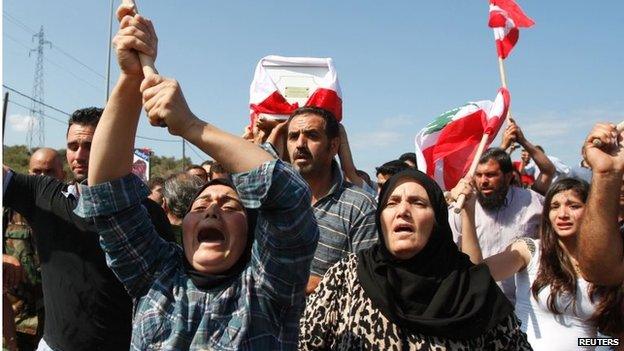
About two dozen members of the Lebanese security forces were kidnapped by IS in August
Jihadist militants have also carried out a series of deadly bombings in Beirut and elsewhere. They have mostly targeted Iranian facilities and Hezbollah, the Lebanese Shia Islamist group whose fighters have played a key role in helping turn the tide in President Assad's favour.
Lebanese Prime Minister Tammam Salam has warned that the spread of IS poses "a big test that our destiny depends on". His country's many religious and political factions have been urged to put aside their differences to ensure the group does not establish a foothold.

Other Arab states
Egypt, Kuwait, and Oman joined Saudi Arabia, the UAE, Qatar, Bahrain, Iraq, Jordan and Lebanon in signing a communique, external at a meeting in Jeddah that declared their "shared commitment to stand united against the threat posed by all terrorism". They pledged to provide military support and humanitarian aid, and to halt the flow of funds and foreign fighters to IS.

France
France was part of the US-led coalition targeting IS in Iraq from September 2014. In September 2015 it carried out its first raids on targets in Syria.
President Francois Hollande vowed to intensify strikes against IS after the group said it was behind the deadly attacks in Paris of 13 November 2015.

United Kingdom
The UK parliament voted in December 2015 to extend its bombing campaign against IS in Iraq to targets in Syria. The motion to strike targets in Syria was put forward by the Conservative government and opposed by the Labour leader, Jeremy Corbyn.
Mr Corbyn urged Labour MPs to vote against the strikes but allowed them a free vote, and 67 MPs voted in favour. UK strikes began the night of the vote, with RAF Tornados bombing an IS-controlled Omar oil fields in eastern Syria.
The UK parliament had in 2013 voted against strikes in Syria. It approved British air strikes against IS targets in Iraq in September 2014.

Other European Union countries
Belgium, Denmark and the Netherlands are part of the US-led coalition carrying out strikes in Iraq.
On 4 December 2015, the German parliament backed plans for the country to join the fight against IS in Syria, three weeks after the Paris attacks in November 2015.
Germany previously provided weapons to Kurdish fighters but ruled out air strikes.

Canada
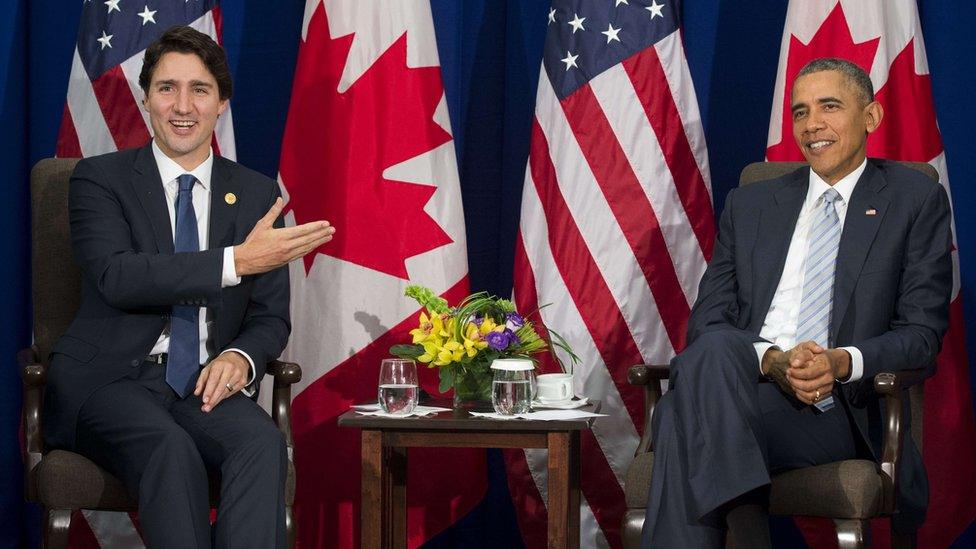
Justin Trudeau's election will mean a change in Canadian participation in the US-led coalition
New Canadian Prime Minister Justin Trudeau has confirmed he will withdraw Canadian fighter jets from the air strikes against IS in Iraq and Syria, fulfilling a campaign pledge.
He informed President Obama of his decision hours after winning Canada's general election in October 2015.

Australia
Australia is part of the international military coalition targeting IS strongholds in Syria and Iraq.
It launched its first air strikes inside Syria in September.